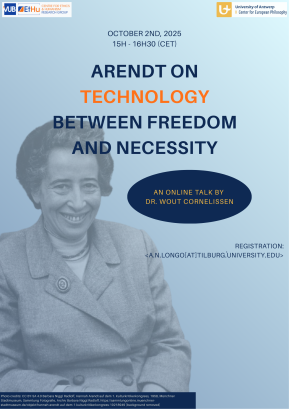Dear colleagues,
On 2 October (15:00-16:30), Dr. Wout Cornelissen is giving an online talk on Hannah Arendt’s engagement with the question of technology. Dr. Cornelissen, known for his archival study of Hannah Arendt’s work, will reflect on some text fragments exemplifying Arendt’s general research attitude toward the question of technology. The talk will leave ample space for questions and discussion.
Please register for the talk via < a.n.longo[at]tilburguniversity.edu > before 29 September. You will receive the Zoom-link and accompanying text materials on September 30th.
This talk serves as a ‘prologue' for the conference “Coming to terms with technology: thinking with/in/through Hannah Arendt” (23-24 October, Brussels, Belgium).
Abstract: One of the major themes in Arendt’s work is that of the distinction and tension between freedom and necessity. The phenomenon of human technology can be understood to sit at the intersection of both, at least insofar as it harbors both the promise of liberation from necessity (or mere survival, and toil) and the threat of (further) human entanglement in coercive structures of our own making. In this workshop, we’ll draw on various passages from Arendt’s work, published and unpublished, with a specific focus on The Human Condition and The Life of the Mind, her last and unfinished book project. Our goal will be twofold: to trace and analyze Arendt’s various forms of thinking and writing about freedom and necessity, and to draw on the recent “archival turn” in the study of Arendt’s work.
Dr. Wout Cornelissen is appointed as Assistant Professor of Philosophy of Law at Radboud University, Nijmegen. Previously, he held positions at, among others, Freie Universität Berlin, Vanderbilt University, and Bard College. He holds a Ph.D. in Political Philosophy from Leiden University. He co-edited the new, critical edition of Arendt’s The Life of the Mind, which came out in 2024 as Vol. 14 of the Complete Works: Critical Edition (Wallstein Verlag). He published essays on Arendt’s conceptions of thinking in Artifacts of Thinking: Reading Arendt's Denktagebuch (Fordham UP, 2017) and The Bloomsbury Companion to Arendt (2020), and on her practice of quoting in The Phenomenology of Testimony (Brill, 2025).
We hope to see you there,
Dr. Anthony Longo (Tilburg University)
Dr. Julia Maria Mönig (University of Bonn)
Judith Campagne (Vrije Universiteit Brussel)

